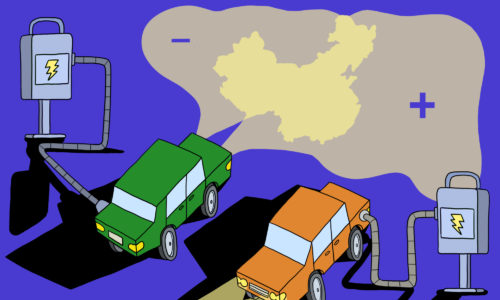An interesting data point
Thank you.
Welcome, The China Project Access members! We greatly appreciate your support.
This is the first edition of our members-only Friday newsletter. Below, you will see a short report of news from today, followed by custom The China Project summaries of all the things we think you should — or might want to — know about what happened in and relating to China this week.
Please check your email inboxes for an invitation that we have sent out to join us on instant-messaging service Slack. We use Slack as our digital newsroom, and have created a channel specifically for members to meet each other and chat anytime with our editors. Once per week for an hour, we will dedicate our editorial time to interacting with members (this is tentatively scheduled for 11am-12pm EST every Thursday), but we’ll answer questions left on the Slack channel by members within 24 hours on workdays.
On Slack, you can ask us questions about China, comment on our reporting or request new topics for us to cover, meet other members, and occasionally chat with guests of the calibre of our Sinica Podcast interviewees.
As always, you can contact me anytime by replying to this email or reach our whole editorial team on editors@thechinaproject.com. We love feedback, whether it’s praise or rotten tomatoes.
The end of eight fat years of smartphone growth
An interesting data point:
The growth story of the world’s largest smartphone market, China, came to an end as it suffered its first-ever annual decline, with shipments down by 4% from 2016 to 459 million units in 2017.
That’s according to Canalys, a research firm focused on smartphones. One of the researchers behind the report told the BBC that consumers who have already traded up from basic phones to entry-level smartphones, don’t feel a need to upgrade. There are two interesting possibilities suggested by this data:
The low hanging mobile fruit is gone
If everyone in China has a half decent smartphone, it will be much more difficult to convince consumers to upgrade than it was to get them to buy their first smartphone. If you’ve got a Xiaomi, there’s no need to reach up into the high branches for an Apple.
This means that weaker mobile phone manufacturers will suffer. According to Canalys, “the declining Chinese market will have a detrimental impact on those Chinese vendors that have been heavily relying on their home market…The threat to vendors such as Gionee and Meizu is now closer than ever.”
The end of crazy growth in China, or just the beginning?
In the 1970s and 80s, Chinese people talked about “three big things” (三大件 sān dà jiàn) that you had to have as a proper adult: a watch, a radio, and a bicycle. In the 90s, the three big things became a computer, a VCR, and air conditioning. Then it became an apartment, a car, and either a load of cash or a foreign passport. But really, there are no longer three big things.
There’s just one big thing: a mobile phone. With a smartphone, you can buy train tickets and groceries, borrow money, livestream your life and get paid for it, fill in government forms, apply for jobs, you name it. On the other hand, if you don’t have a smartphone set up for use in China, everything from catching a taxi to paying street vendors has become a hassle.
But if everyone in China now has the one big thing, is that a signal that China’s rapid economic growth — from a low base — has peaked? Is now the moment when China begins to resemble Japan in the 1990s? Or does the fact that even the poorest peasant farmers now have smartphones mean that a truly networked China is about to astound us once again with a period of robust economic growth?
—Jeremy Goldkorn, Editor-in-Chief
Follow The China Project on: Twitter | Facebook | Instagram
Listen to this week’s Sinica Podcast: Yukon Huang, the China economy contrarian
THIS WEEK’S NOTEWORTHY NEWS:
- The ugly side of China’s beauty consumption boom
An emphasis on luxury products that claim to fight the effects of aging has plunged some Chinese women into debt and desperation. Social media and paid influencers create frenzies around certain products and market them to upwardly mobile customers who want to be part of the “rich lady” class.
- New drone to have 20-ton payload
Chengdu-based Tengoen Technology (腾盾科技 téngdùn kējì), a company founded in 2016, is building a 137-wide drone designed to carry up to 20 tons up to 4,660 miles. Over 110 companies in Chengdu now manufacture drones and unmanned aerial vehicles.
- First skirmishes in a trade war?
The Trump administration applied tariffs on imports of washing machines and solar panels on January 22, perhaps the first move in his long-promised campaign to eliminate cheap imports. Some Chinese solar companies shrugged, some were happy at the development. The executive of at least one U.S. solar company was furious. Some analysts say China might retaliate against Boeing, Apple, and soybean imports from the U.S.
- World first cloned monkeys born in China
Researchers successfully cloned two monkeys at the Chinese Academy of Sciences Institute of Neuroscience in November and December 2017, using the same technique that led to the birth of Dolly the cloned sheep in Scotland 20 years ago. Because monkeys are primates, the procedure is the closest yet that scientists have come to cloning humans, raising ethical concerns. See also The China Project video.
- China’s economic mastermind promises blue skies and controlled debt in 3 years
Liu He 刘鹤, one of Xi Jinping’s closest advisors, spoke at the World Economic Forum in Davos on January 24. There, he made lofty rhetorical commitments to the idea of globalization, alongside specific promises to clear up China’s smoggy skies and get debt under control.
- Davos provides propaganda opportunity for China
U.S. President Donald Trump arrived at Davos on January 25 for the World Economic Forum in the midst of a Chinese propaganda bonanza. Chinese officials and state media revealed in the praise that China is getting for sticking in the Paris Agreement and for its rhetorical commitments to globalization.
- Jared Kushner is China’s trump card / New Yorker (paywall)
Adam Entous and Evan Osnos detail how the President’s son-in-law became a point person for Chinese diplomats in their approach to the Trump administration and mounting concerns among U.S. intelligence over Kushner family conflicts of interest.
- The truth about China’s unknown millions of drug users / Sixth Tone
A survey showed that “the proportion of men who had tried new drugs increased from 3.4 percent in 2010 to 5 percent in 2015, while women who used new drugs increased from 0.8 percent to 2.1 percent.” But in China, it “is not true that the younger you are, the more likely you are to take drugs.”
- WeChat Pay now allows users to bind overseas credit cards / TechNode
“This is the first time users are able to use WeChat Pay without having a Chinese bank account or credit card.”
JANUARY 26 — TODAY’S NEWS
- Polar Silk Road
China to develop Arctic shipping routes opened by global warming / BBC News - Davos propaganda
Fake news: China’s state media used fabricated quotes to play up Xi Jinping’s influence at Davos / Quartz; also discussed in Axios China this week. - Cryptocurrency
PBoC official pushes for centralized state digital currency / CoinDesk - Elite politics: Liu He to be promoted
Exclusive: China to name Harvard-trained Liu He as vice premier overseeing economy / Reuters
What’s next in China’s financial crackdown / Axios - CBRC to merge with CIRC?
China considers merger of banking, insurance watchdogs / Bloomberg - Anti-corruption
Xi Jinping puts China’s mafia in cross hairs, but fears of judicial abuse remain / SCMP - 19th Party Congress analysis
Alice Miller analyses the The 19th Central Committee Politburo / Hoover Institution
ON SUPCHINA
China Sports Column: Ways in which Chinese football teams circumvent every rule
The China Sports Column is a weekly feature on The China Project written by Mark Dreyer. In today’s edition: Nowhere is rule-bending more prevalent in Chinese society than in Chinese soccer. The sport’s latest examples can be found in the Chinese Super League, where Tianjin Quanjian, Hebei Fortune, and Beijing Guoan have all exploited loopholes, from requirements to play young Chinese players to a tax on foreign transfers.
‘I am a woman worker at Foxconn, and I demand a system that opposes sexual harassment’: A translated essay
On January 23, the women’s labor rights website Jianjiaobuluo 尖椒部落 published an essay by a female worker at Foxconn who wants her company — which is Apple’s main Asia supplier — to create a system that opposes sexual harassment, and one that offers proper recourse to victims of sexual harassment, such as herself.
Sinica Podcast: Yukon Huang, the China economy contrarian
Yukon Huang of the Carnegie Endowment discusses how both bears and bulls get the whole picture of China’s economy wrong, and what the real issues are with corruption, debt, unbalanced development, innovation, and more.
- Subscribe to the podcast via Overcast, iTunes, or Stitcher.
Video: A rare glimpse into China’s astronaut training program
As China’s quest to conquer outer space proceeds with sky-high ambitions, a newly released video shows the country’s space explorers preparing for business. China plans to launch a new space station by 2022.
Video: A conversation with Michael Chu on China’s economic future
We spoke with Michael Chu, founder and co-CEO of L Catterton — the world’s leading consumer-focused private equity firm — on Jan. 17 in New York City as part of the The China Project NEXT CHINA Conference.
- Did you miss the conference, or wish to watch it after-the-fact? Purchase a recording for $28.88!
The China Project geography quiz
A 20-question quiz about Chinese geography. How well do you know your way around China’s rolling plateaus, basins, and massifs, its mountains and rivers and valleys, its special economic zones and autonomous regions? Take this The China Project Geography Quiz to find out!
Video: Next China conversations
- A conversation with Michael Szonyi on Chinese politics
- A conversation with Stephen Roach about macroeconomics in China
More:
- Suing the homophobia out of China’s textbooks
Katharin Tai reports that a college student in Guangzhou is taking the unusual — and unprecedented — step of bringing a lawsuit upon a publisher based on a consumer rights law. - Chinese rapper GAI removed from reality show amidst government crackdown on hip-hop culture
Pang-Chieh Ho reports that last Thursday, rumors began to circulate that Chinese rapper GAI, also known as Zhou Yan 周延, had been removed from Hunan TV’s reality competition show Singer 歌手 (gēshǒu). Media suspects that the Chinese government’s recent move to curb hip-hop culture might be the reason behind the rapper’s sudden departure. - The Caixin-Sinica Business Brief, episode 36
- Video: Would-be purse snatcher in China catches some fists
- Video: Chinese scientists score a cloning victory with monkeys
BUSINESS AND TECH
EARLIER THIS WEEK:
- China advances gene editing with American technology
In China, less regulation means faster access to human trials for controversial gene-editing technology. According to the Wall Street Journal, at least 86 Chinese patients have had their DNA altered since 2015 using the American Crispr-Cas9 technology.
- First state-owned electric car company goes public in China
Beijing Electric Vehicle Co. (BJEV) will trade on the Shanghai stock exchange following its $4.5 billion purchase by BAIC Group. It will now compete more directly with leading domestic carmaker BYD, as both companies are buoyed by high investor enthusiasm in electric vehicles.
- Chinese airlines to allow mobile phone use and offer wifi
This week, thirteen Chinese airlines — including Hainan Airlines, China Eastern, and Air China — announced that passengers could use mobile phones on their planes after a regulatory easing. Now if only they could fix the food!
- China’s Didi buckles up for Spring Festival traffic and a possible price war with Meituan
The heated competition between ride-hailing giant Didi Chuxing and “super-app” Meituan Dianping heated up, as Meituan added more services and Didi re-introduced subsidies in select cities. Meanwhile, Didi is expecting 33 million passenger trips on its Inter-City Hitch carpool service during Spring Festival this year.
POLITICS AND CURRENT AFFAIRS
EARLIER THIS WEEK:
- Hong Kong bookseller seized again as Swedish diplomats looked on
Gui Minhui had been “freed” in October after two years in Chinese custody, but on January 20 was taken off a Beijing-bound train by a group of about 10 plainclothes men, according to his daughter Angela. Gui was accompanied by two Swedish diplomats at the time of his seizure, but it is unknown if they attempted to intervene.
- Sweden summons Chinese ambassador over snatching of bookseller
China’s Ministry of Foreign Affairs implied that Swedish diplomats had broken unspecified Chinese laws in their accompaniment of the Swedish citizen Gui Minhui, who was abducted by Chinese agents in Beijing. Sweden’s Foreign Ministry twice summoned the Chinese ambassador to get answers, but none have been made public.
- When it comes to China business, Ivanka Trump and Jared Kushner have no comment
Questions continue to swirl over the labor conditions and political ramifications of Ivanka Trump’s business in China. Meanwhile, Ivanka’s husband, Jared Kushner, has reportedly stopped seeking money from Chinese investors in exchange for visas.
SOCIETY AND CULTURE
EARLIER THIS WEEK:
- Chinese university instructors sign anti-sexual harassment manifesto (full translation)
More than 50 instructors from over 30 colleges in China have signed an anti-sexual harassment manifesto drafted by Xu Kaibin 徐开彬, a journalism professor at Wuhan University. Published January 18, the manifesto aims to showcase the teachers’ zero tolerance for sexual assault on Chinese campuses.
- Creepy versions of kids videos found in China too
Elsagate has arrived in China. On January 22, China’s National Anti-Piracy and Pornography Working Committee announced it would target all videos harmful to children, including the use of beloved characters such as Peppa Pig in “violent, horrific, cruel, and pornographic” acts. By the next day, keywords such as Elsa 艾尔莎, Spider-Man 蜘蛛侠, surgery 手术, and injection 打针 were displaying no results on video search engines.
- Sick pandas on Chengdu research base provoke outrage
The largest panda facility in the world, the Chengdu Research Base of Giant Panda Breeding, is in hot water over alleged mistreatment of its animals after photos emerged online showing a panda’s eye severely infected by mites. The photos were posted on January 19 by Weibo user @酵母菌大王.
- Public incensed by story of 11-year-old impregnated by rapist in rural China
An 11-year-old girl in the town of Magutian 马谷田 in Henan Province was found pregnant after being raped by a staff member at her school. The assaults reportedly began when she was 9 years old. The news sparked tremendous outrage among the Chinese public, with many demanding that the rapist be sentenced to death.
- Hong Kong university groups rally behind students suspended for protesting Mandarin test
Two students at Hong Kong Baptist University, Lau Tsz-kei 刘子颀 and Andrew Chan Lok-hang 陈乐行, have been suspended following protests on their campus against a compulsory Mandarin language proficiency test last week, school president Roland Chin Tai-hong 钱大康 announced on January 24. Student groups around Hong Kong have rallied to the students’ defense.
- Why Chinese youth are obsessing over a traveling frog in the mobile game Tabi Kaeru
The most downloaded free game from Apple’s China App Store is a Japanese-produced simulation that makes users experience the anxiety and joy of caring for a virtual green frog. Tabi Kaeru, otherwise known as Travel Frog, was developed by Hit-Point, and it’s causing addicted players to obsessively check their phones.
PHOTO FROM MICHAEL YAMASHITA
Chinese garden
A typical Chinese garden in Beijing. Enclosed by walls, a garden usually features landscapes of rocks, water, and plants connected by zigzag pathways connecting pavilions.
—Jia Guo






